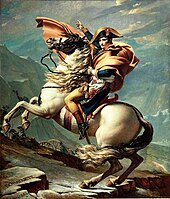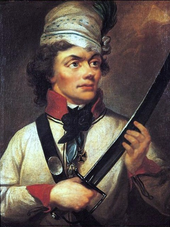User:Kpalion/Pan Tadeusz
Appearance
Timeline
[edit]| Year | Historical events | Fictional events and fictionalized references to historical events |
|---|---|---|
| 1768 | A patriotic faction known as the Bar Confederation unsuccessfully challenges Russia in the Russo-Turkish War. | Maciek Dobrzyński is a member of the Bar Confederation.(VI 506) |
| 1772 | First Partition of Poland | |
| 1780 | Polish patriot Tadeusz Rejtan commits suicide. | A portrait of Rejtan committing suicide is among the paintings hanging in the Judge Soplica's mansion.(I 62) The Tribune used to hunt together with Rejtan.(V 510) |
| 1789 | The French Revolution begins. Russian forces commanded by Prince Grigori Potemkin and Gen. Alexander Suvorov capture the fortress of Ochakov during a new Russo-Turkish War. |
Capt. Rykov fights in the Siege of Ochakov.(X 113) |
| 1791 | The Great Sejm adopts the Constitution of 3 May. Suvorov captures Izmail and massacres its inhabitants. |
Pantler Horeszko is a supporter of the constitution. Rykov fights in the Siege of Izmail.(X 113) |
| 1792 | A war with Russia, which backed the conservative faction known as the Targowica Confederation, breaks out. Prince Józef Poniatowski and Gen. Tadeusz Kościuszko become Polish heroes, but the war is lost, resulting in the constitution's cancellation. | Jacek Soplica fatally shoots Pantler Horeszko during a siege laid to the Horeszko Castle by the Russian Army. Jacek's son is born and named Tadeusz in Kościuszko's honor. Sometime later Tadeusz's mother dies and Jacek becomes a Bernardine monk, assuming the name Worm (Robak). |
| 1793 | Second Partition of Poland | |
| 1794 | Kościuszko Uprising, an insurgence led by Kościuszko against Russian influence in Poland, breaks out and fails. The final Battle of Praga is followed by a massacre of the civilian population of the Warsaw suburb ordered by Suvorov | Rykov fights in the battles of Racławice and Maciejowice.(X 137-139) Maciek Dobrzyński fights in the Battle of Praga. Paintings of Kościuszko swearing an oath and of Generals Jakub Jasiński and Samuel Korsak defending Praga are among the portraits hanging in Judge Soplica's mansion. |
| 1795 | Third Partition of Poland; the Polish-Lithuanian Commonwealth is erased from the map. | |
| 1797 | Gen. Henryk Dąbrowski musters Polish Legions in Italy. Gen. Józef Wybicki pens Mazurek Dąbrowskiego (Poland Is Not Yet Lost), a song that will become Poland's national anthem. | Jankiel is the first to popularize the Song of the Polish Legions in the Soplicowo area. In 1812, he will play it on a dulcimer in the presence of Gen. Dąbrowski himself. A musical clock playing this patriotic tune is among the furniture of Judge Soplica's mansion. |
| 1798 | Adam Mickiewicz is born "in slavery (...) and then swaddled with chain." | Zosia is born to Ewa Horeszkówna and her husband, a voivoide. Her parents are later exiled to Siberia. She is brought up by her aunt Telimena with Father Worm's financial aid. |
| 1799 | War of the Second Coalition: Russian forces defeat the French at Novi, but are forced to retreat from Zurich a month later. | Rykov fights in the battles of Novi and Zurich.(X 114-116) |
| 1800 | French forces defeat the Austrians in the Battle of Hohenlinden. | Father Worm serves as Gen. Karol Kniaziewicz's messenger at Hohenlinden. |
| 1801 | Tadeusz begins his education in Wilno (Vilnius). | |
| 1802 | The Danube Legion led by Gen. Władysław Franciszek Jabłonowski is sent to quell the Haitian Revolution. | Jabłonowski is mentioned in a digression as a commander who "smites Negroes, but sighs for his land." |
| 1804 | Napoleon Bonaparte crowns himself Emperor of the French. | Napoleon, dubbed the "god of war" by the author, is mentioned several times in the poem. |
| 1805 | Napoleon defeats Austrian and Russian armies in the Battle of Austerlitz during the War of the Third Coalition. | Father Worm(IV 418) and Rykov(X 136) fight – on opposite sides – in the Battle of Austerlitz. |
| 1806 | Napoleon defeats the Prussian army in the Battle of Jena. Dąbrowski aides the French war effort by igniting the Greater Poland Uprising. | Bartek Dobrzyński is in Poznań when he learns about the French victory at Jena and joins in the uprising. |
| 1807 | Napoleon's victory in the War of the Fourth Coalition, concluded with the Treaties of Tilsit, leads to creation of the Duchy of Warsaw and the Free City of Danzig. | Rykov fights in the Battle of Preussisch-Eylau.(X 114) Father Worm treats Gen. Dąbrowski to his tobacco snuff during the Siege of Danzig. The Treaties of Tilsit revive Polish national hopes in the Duchy of Warsaw, but leave Lithuania under Russian rule, disappointing Judge Soplica, among other patriots. |
| 1808 | Napoleon defeats Spanish forces in the Battle of Somosierra during the Peninsular War. | Father Worm is twice wounded at Somosierra. |
| 1811 | The Great Comet of 1811 is visible to the naked eye during most of the year, becoming most conspicuous in October. | The Tribune and the Chamberlain observe and divine from the comet. On his deathbed, Jacek hears the news that the General Confederation proclaimed reunification of Poland and Lithuania (this, in fact, happened in the following year). See below for details of events in 1811. |
| 1812 | The General Confederation of the Kingdom of Poland announces the re-establishment of the Polish-Lithuanian Commonwealth. Napoleon's Grande Armée invades Russia soon afterwards. | 40 thousand Polish troops serving in the V Corps of the Grande Armée under the command of Prince Poniatowski and generals Dąbrowski, Kniaziewicz, Kazimierz Małachowski, Romuald Giedroyć and Michał Grabowski are quartered at Soplicowo for three days. See below for details of events in 1812. |
| 1813 | Napoleon retreats from Russia. | The epic ends in 1812 in a highly optimistic mood and does not mention the tragic fate of the Grande Armée. |
| 1821 | Napoleon dies in exile on Saint Helena. | In the Epilogue, the author says that Lithuanians mourn a dog longer and more sincerely than the French do their hero, i.e. Napoleon. |
| 1830 | The November Uprising breaks out and is suppressed by Russia the following year, prompting a new wave of Polish political emigration, known as the Great Emigration. | The November Uprising is alluded to in the Epilogue which speaks of "Mother Poland (...) So freshly entombed". |
| 1834 | Mickiewicz finishes his work on Pan Tadeusz and publishes the poem in Paris. |
Books 1–10: Summer of 1811
[edit]Books 11–12: Spring of 1812
[edit]| Day | Book | Events |
|---|---|---|
| 24 March Tuesday |
Book 11 |
Evening:
|
| 25 March Wednesday Feast of Annunciation |
Morning:
| |
| Book 12 | Afternoon:
|
Characters
[edit]Fictional
[edit]Soplica family and friends
[edit]

- Jacek Soplica / Father Worm
- Judge Soplica (Sędzia)
- Tadeusz Soplica
- Chamberlain (Podkomorzy)
- Anna and Róża, Chamberlain's daughters
- Tribune Hreczecha (Wojski)
- Usher Protazy Brzechalski (Woźny)
- Rejent Bolesta
- Asesor
Horeszko family and friends
[edit]| Pantler's father | Pantler's aunt | Castellan | |||||||||||||||||||||||||||||||||||||||||||||||||||||||
| Cup-Bearer Soplica | Pantler Horeszko | Castellan's 1st daughter | Castellan's 2nd daughter | ||||||||||||||||||||||||||||||||||||||||||||||||||||||
| Judge Soplica | Jacek Soplica | Jacek's wife | Voivode | Ewa Horeszkówna | Master of the Hunt | Count's mother | |||||||||||||||||||||||||||||||||||||||||||||||||||
| Tadeusz Soplica | Zosia | ||||||||||||||||||||||||||||||||||||||||||||||||||||||||
Historical
[edit]Historical figures mentioned in the poem





- Alexander I
- Algirdas
- Wojciech Bartochowski (1648–1708), author of Fulmen Orientis, a panegyric praising King John III as the "Bolt of the East".
- Jerzy Białopiotrowicz (ca.1734–ca.1802), military notary and master of the hunt of Lida (?), one of the leaders of the Kościuszko Uprising in Wilno
- Boleslaus the Brave
- Jérôme Bonaparte
- Napoleon Bonaparte
- Pieter Brueghel the Elder
- Constantine Pavlovich
- Adam Kazimierz Czartoryski
- Jan Henryk Dąbrowski
- Henryk Dembiński
- Józef Dwernicki
- Francis II
- Gediminas
- Romuald Giedroyć
- Michał Grabowski
- Hedwig of Poland
- Władysław Franciszek Jabłonowski
- Jakub Jasiński
- John III
- Kęstutis
- Karol Kniaziewicz
- Jan Kochanowski
- Samuel Korsak (1745–1794), one of the leaders of the Kościuszko Uprising in Wilno (Vilnius)
- Tadeusz Kościuszko
- Jan Kozietulski
- Kazimierz Małachowski
- Jan Jakub Meyen (1753–?), one of the leaders of the Kościuszko Uprising in Wilno (Vilnius)
- Mindaugas
- Stanisław Mokronowski
- Karl von Nassau-Siegen (1745–1808), German military officer, admiral of the Russian fleet
- Józef Niesiołowski (1728–1814), voivode of Nowogródek (Navahrudak), one of the leaders of the Kościuszko Uprising in Wilno
- Aleksander Orłowski
- Ludwik Michał Pac
- Marcin Poczobutt-Odlanicki
- Józef Poniatowski
- Włodzimierz Potocki (1788–1812), Polish aristocrat who founded and commanded a horse artillery regiment in the Duchy of Warsaw
- Dominik Hieronim Radziwiłł
- Karol "Kochanku" Radziwiłł
- Mikołaj Krzysztof "Sierotka" Radziwiłł
- Tadeusz Rejtan
- Jacob Isaakszoon van Ruisdael
- Eustachy Erazm Sanguszko
- Sigismund Augustus
- Jan Śniadecki
- Stanislaus Augustus
- Maciej Stryjkowski
- Alexander Suvorov
- Jan Baptysta Tęczyński (1540–1563), voivode of Belz, famous for his unfulfilled plans to marry Princess Cecilia of Sweden
- Antoni Tyzenhauz
- Urban VIII
- Vytenis
Wikisource has original text related to this article:





